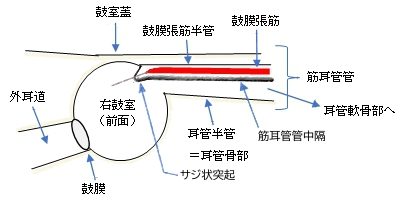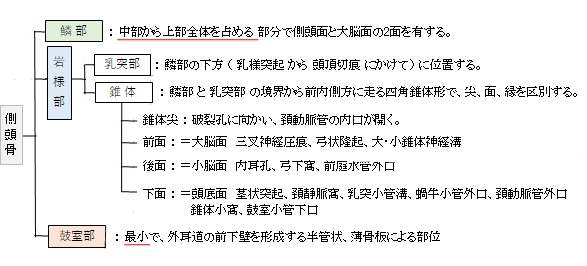


【特徴】※参考:「船戸和也のHP」
1.鼓膜張筋半管を下から被うような非常に薄い不完全なチューブ状の骨管
「不完全なことが普通であるが,時には完全なこともある.」(船戸和也のHP)
2.後壁は鼓室の内側壁(迷路壁)の前上隅から後下に弓なりに隆起し、顔面神経管隆起に沿って走る。
3.外方に向かって開口するサジ状突起として終わる。

「 船戸和弥のHP 」では以下のように解説している。
「筋耳管管中隔ははなはだ薄い骨が半載したチューブのような形となって鼓膜張筋半管を下から被っている。その後壁は鼓室の内側壁(迷路壁)の前上隅から後下に弓なりに隆起する顔面神経管隆起に沿って少し鼓室内に突出し、外方に向かって開口するサジ状突起に終わる。 」
以下は「Wikipedia」の解説文となる。
「The base of the temporal bone is made of the petrous part, the tympanic part and the endotympanic part -when there is one-; it is directed in ventral direction and entirely visible at the ventral side of the skull.
At the basis of its muscular process and medially opens a duct, usually wide, that gives access to the ear drum: it is the bony canal of the auditory tube-formerly Eustachian tube, or musculotubar canal (Canalis musculotubarius). This duct, formed in Men by the petrous part, depends in domestic Mammals of the tympanic part with, in Carnivorous and Ruminants, a little participation of the basisphenoid bone. It is subdivided by a thin incomplete bony sheath (Septum canalis tubae auditivae) in a part reserved to the auditory tube (Semicanalis tubae auditivae) and a part (Semicanalis muscularis) giving way to a muscular insertion that is in Men the one of the tensor tympani and in domestic Mammals the one of the levator veli palatii.」
【 語 句 】
・petrous part:錐体部 ・tympanic part:鼓室部 ・endotympanic part:? ・ventral:腹面の ・muscular process:筋突起 ・duct:導管 ・ear drum:鼓膜 ・auditory tube:耳管 ・Eustachian tube:エウスタキオ管(=耳管) ・domestic Mammals:家畜哺乳類 ・Carnivorous:肉食性の ・Ruminant:反芻動物 ・basisphenoid bone:基蝶形骨 ・sheath:さや ・tensor tympani:鼓膜張筋 ・levator veli palatii:口蓋帆挙筋
■ 写真やイラストを掲載しているサイト ■
・ イラストや写真を掲載しているサイト-Ⅰ
・ イラストや写真を掲載しているサイト-Ⅱ
・ イラストや写真を掲載しているサイト-Ⅲ
